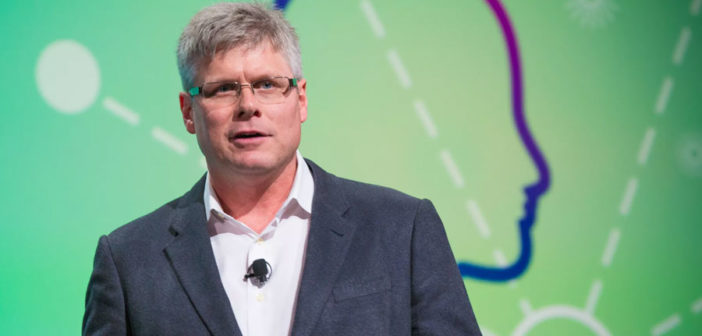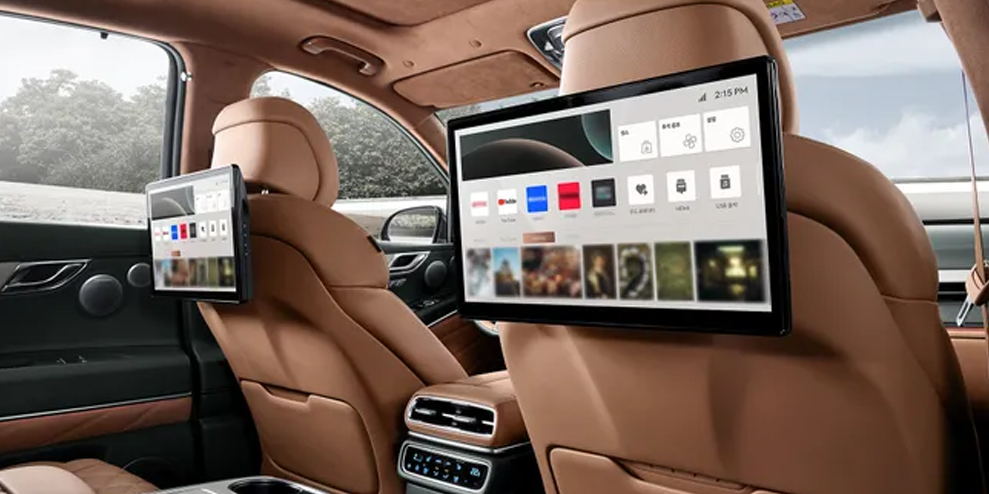That’s coming from the head of the world’s largest mobile chip maker.
Remember that excitement when you held the original iPhone?
You may get that feeling back, only it’ll likely be behind the wheel of a car.
That’s according to Qualcomm CEO Steve Mollenkopf, who believes the most exciting advances in tech over the next decade will come in automotive.
“The car is going through a massive wave of innovation,” Mollenkopf said in an interview on Thursday at the Frankfurt Auto Show. Many of those innovations are in areas Qualcomm has expertise, he said. “You’ll see more and more of us here.”
The comments underscore a shift in focus for the world’s largest maker of chips for smartphones. Qualcomm’s technology connects devices — including some models of Apple’s newest iPhones — to cellular networks, as well as acts as the brains of phones like Samsung’s Galaxy S8. But the mobile market is slowing down, and Qualcomm has been looking to expand in faster growing areas.
It’s telling that as the whole tech world paid attention to the launch of Apple’s newiPhone X, Mollenkopf was flying to Germany. It also doesn’t hurt that his company is locked in a heated licensing battle with Apple, and he probably wouldn’t have felt very welcome in Cupertino.
Not just faster, but smarter
As cars do more things, there’s need for more advanced processors to power the vehicles both under the hood and for in-vehicle controls and entertainment. Market researcher IDC estimates semiconductor suppliers will generate $50.1 billion from the automotive market in 2021, up 52 percent from 2016.
Qualcomm’s efforts in automotive are focused around three main areas: Connectivity, computing and electrification, Mollenkopf said. It builds processors to connect a car to other vehicles and to the world around it; improves the experience inside the car for the driver and passengers; and enables new technologies like electric cars and autonomous vehicles.
Auto “will be the most innovative platform of the next decade,” Mollenkopf told German Chancellor Angela Merkel, who stopped by the Qualcomm booth on Thursday at the auto show to learn about the company’s technology. The most innovative product of the last decade? Smartphones, he said.
Many technologies found in phones will make their way to cars, he said. That includes 5G, the next big phase of mobile connectivity. 5G is expected to be 100 times faster than our current wireless technology and 10 times speedier than what Google Fiber offers through a physical connection to the home. In automotive, it will let cars seamlessly talk to each other or connect to a network for critical vehicle functions.
“Cars are now saying, ‘I need special features because I’m going to rely on the network for mission critical things, safety, transportation efficiency,'” Mollenkopf said. He added that 5G, which is expected in phones in 2019, won’t be far behind in vehicles.
“The speed in which the car is taking in new technology is increasing rapidly,” Mollenkopf said.
That hasn’t always been the case. It took years for the car industry to embrace cellular connectivity, and wireless industry executives often talked about the longer development cycles that went into cars versus phones.
To expand its footprint in auto, Qualcomm a year ago launched a bid to purchase NXP Semiconductors, the world’s biggest auto chip supplier, for $39 billion. The deal, the largest ever in the semiconductor industry, has run into some EU regulatory hurdles, though. Mollenkopf still expects the deal to close by the end of 2017.
“We haven’t seen anything we didn’t expect both from timing and [the EU]stopping the clock,” Mollenkopf said. “It’s a process we have to go through versus something we don’t think we’ll be able to get through it.”
The smartphone of the future
While Mollenkopf is optimistic about automobiles, that doesn’t mean phones are over.
Apple on Tuesday showed off its vision of the smartphone of the future with the iPhone X. The device has a 5.8-inch OLED screen with ultraslim bezels, and it did away with the traditional home button. The iPhone X introduced Face ID as a new way to unlock the phone and make purchases using Apple Pay.
Even with the licensing dispute between the companies, Apple reportedly continues to use Qualcomm processors in its newest devices. Mollenkopf declined to comment about the new iPhones beyond saying he hasn’t seen them yet and that teardowns would show what chips are in the devices. With the iPhone 7 and 7 Plus, certain versions used Qualcomm modems while others used Intel.
In Qualcomm’s view, “a lot of innovation [in smartphones]is moving into the camera,” Mollenkopf. He noted that Qualcomm in late August signed a deal with a Taiwanese company to introduce 3D cameras in Android devices. That would enable things like the face unlock technology found in the iPhone X. Other areas companies are innovating include augmented reality, security and “hardware that does low power machine learning,” Mollenkopf said.
Another big focus for the next couple of years will be Gigabit LTE and 5G, Mollenkopf said. And more smartphone-like capabilities will move into companion devices like smartwatches and headsets. “The next step is people put things on their eyes,” Mollenkopf said. “They may not do it while they’re walking around, but it may change the way we see video.”
As for the licensing battle with Apple, Mollenkopf still believes the case will be settled out of court, but he couldn’t predict when. In the meantime, Qualcomm is preparing for a trial, he said.
“I do think the history and experience is these things do get settled out of court,” Mollenkopf said. “But sometimes you have to be prepared to go the whole distance.”
–
This article first appeared in www.cnet.com
Seeking to build and grow your brand using the force of consumer insight, strategic foresight, creative disruption and technology prowess? Talk to us at +9714 3867728 or mail: info@groupisd.com or visit www.groupisd.com



